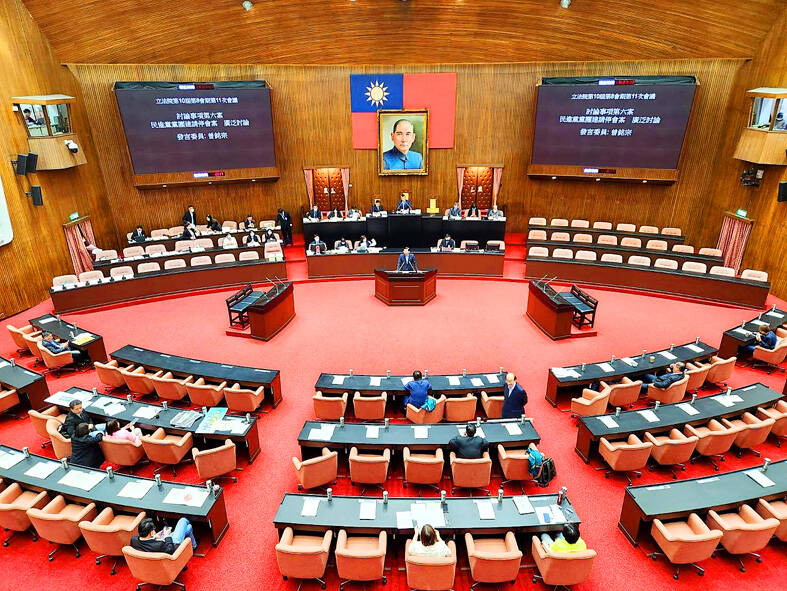The Chinese Nationalist Party (KMT) caucus yesterday announced that it is to review a proposed whistle-blower protection law (吹哨者保護法) this month.
The draft act is part of the KMT caucus’ legislative package that it pledged to complete to “return rights to the people,” along with the amendments to the Criminal Code (刑法) and the Act Governing the Legislative Yuan’s Power (立法院職權行使法), KMT caucus secretary-general Hung Mong-kai (洪孟楷) said, adding that the review could begin in the middle of this month.
“The Executive Yuan has yet to propose its version of the whistle-blower protection act, but we are determined to review the draft act article by article in this legislative session,” Hung said.

Photo: Hsieh Chun-lin, Taipei Times
“We want to let the public see that this is a new legislature and that the KMT caucus would proceed with its own legislative agenda at a proper pace. The DPP caucus should stop rejecting our efforts to do so and the executive branch should try to keep up with our pace,” he added.
Democratic Progressive Party (DPP) caucus secretary-general Rosalia Wu (吳思瑤) said that she respects the right of opposition lawmakers to propose the draft act.
“No one in Taiwan would dispute having such legislation, as well as the spirit and principles that should be laid out in the draft act,” Wu said yesterday. “However, we need to first consider the scope and what aspects the draft act should cover.”
The success of the draft act depends on whether it can be implemented, she added.
“The government’s position has been that the draft act should apply to government departments. However, if we want the draft act to apply to private corporations, we need to consider whether that is feasible,” she said.
Justice officials would need time to review the legislation, Wu added.
“The draft act involves rights and obligations of many stakeholders. It is better that we consider various aspects of the legislation when we review it,” she said.
Meanwhile, Wu reiterated in a meeting of the legislature’s Judiciary and Organic Laws and Statutes Committee that the DPP supports constitutional and legislative reform.
“Authentic reform requires that our duties match our rights stated in the Constitution. Any proposed amendment should not be above the Constitution,” she said.

The first global hotel Keys Selection by the Michelin Guide includes four hotels in Taiwan, Michelin announced yesterday. All four received the “Michelin One Key,” indicating guests are to experience a “very special stay” at any of the locations as the establishments are “a true gem with personality. Service always goes the extra mile, and the hotel provides much more than others in its price range.” Of the four hotels, three are located in Taipei and one in Taichung. In Taipei, the One Key accolades were awarded to the Capella Taipei, Kimpton Da An Taipei and Mandarin Oriental Taipei. Capella Taipei was described by

The Taichung District Court yesterday confirmed its final ruling that the marriage between teenage heir Lai (賴) and a man surnamed Hsia (夏) was legally invalid, preventing Hsia from inheriting Lai’s NT$500 million (US$16.37 million) estate. The court confirmed that Hsia chose not to appeal the civil judgement after the court handed down its ruling in June, making the decision final. In the June ruling, the court said that Lai, 18, and Hsia, 26, showed “no mutual admiration before the marriage” and that their interactions were “distant and unfamiliar.” The judge concluded that the couple lacked the “true intention of

EVA Airways today confirmed the death of a flight attendant on Saturday upon their return to Taiwan and said an internal investigation has been launched, as criticism mounted over a social media post accusing the airline of failing to offer sufficient employee protections. According to the post, the flight attendant complained of feeling sick on board a flight, but was unable to take sick leave or access medical care. The crew member allegedly did not receive assistance from the chief purser, who failed to heed their requests for medical attention or call an ambulance once the flight landed, the post said. As sick

INDUSTRY: Beijing’s latest export measures go beyond targeting the US and would likely affect any country that uses Chinese rare earths or related tech, an academic said Taiwanese industries could face significant disruption from China’s newly tightened export controls on rare earth elements, as much of Taiwan’s supply indirectly depends on Chinese materials processed in Japan, a local expert said yesterday. Kristy Hsu (徐遵慈), director of the Taiwan ASEAN Studies Center at the Chung-Hua Institution for Economic Research, said that China’s latest export measures go far beyond targeting the US and would likely affect any country that uses Chinese rare earths or related technologies. With Japan and Southeast Asian countries among those expected to be hit, Taiwan could feel the impact through its reliance on Japanese-made semi-finished products and